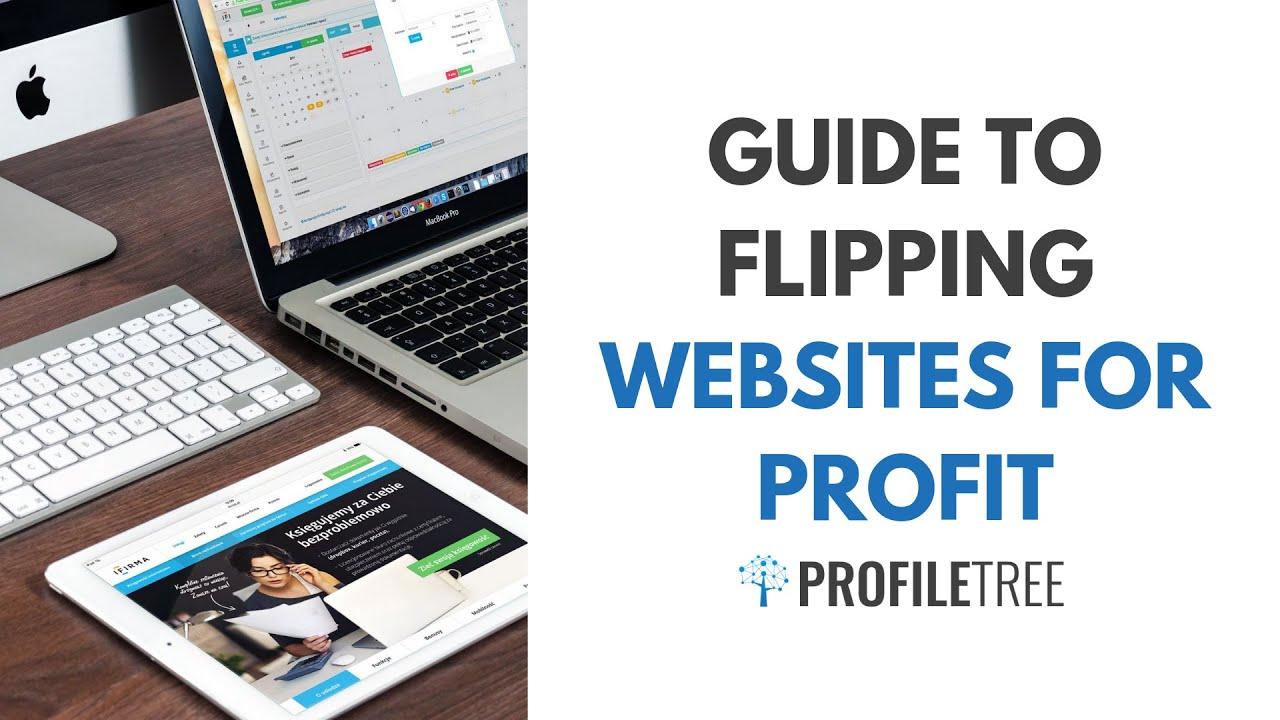Table of Contents
- Understanding the Website Flipping Marketplace Dynamics
- Evaluating Website Value: Key Metrics Every Flipper Should Know
- Choosing the Right Platform for Buying and Selling Websites
- Strategies for Successful Website Flipping: Tips from Industry Experts
- Navigating Legal and Ethical Considerations in Website Flipping
- Q&A
- Concluding Remarks


Understanding the Website Flipping Marketplace Dynamics
The website flipping market has evolved into a dynamic ecosystem where entrepreneurs, investors, and tech-savvy individuals converge to buy and sell online properties. This unique marketplace operates on principles similar to real estate but is fueled by digital trends. Sellers often aim to leverage their websites’ existing traffic and revenue potential, making them attractive to buyers looking for profitable investments or ready-made businesses. Understanding the nuances of this market is vital for anyone trying to navigate through it.
Key factors influencing this marketplace include website niche, revenue streams, and growth potential. Buyers typically look for sites in lucrative niches that show promise for expansion. More specifically:
- Niche Saturation: Highly competitive niches can either deter potential buyers or drive prices higher depending on the demand.
- Revenue Streams: Diverse income sources, such as affiliate marketing, ads, and product sales, can significantly boost a site’s value.
- Growth Potential: Websites with untapped opportunities are often seen as gold mines by buyers willing to invest time and resources.
In this competitive landscape, buyers and sellers must also keep an eye on market trends and shifts in consumer behavior. The rise of SEO best practices, social media marketing, and emerging technologies like AI are reshaping how websites are built, evaluated, and sold. Understanding these elements can offer a strategic advantage. For instance, websites that incorporate modern design or mobile optimization tend to fetch higher prices.
| Factor | Impact on Value |
|---|---|
| Niche Demand | Higher interest increases market value. |
| Content Quality | Well-written and engaging content enhances user retention. |
| SEO Performance | Strong SEO can significantly boost traffic and revenue. |


Evaluating Website Value: Key Metrics Every Flipper Should Know
When diving into the world of website flipping, understanding the metrics that determine a site’s value is crucial. Traffic is one of the primary indicators; it measures how many users visit the website within a specific period. Look for the average daily or monthly visitors, as this gives a clear picture of the site’s popularity. Additionally, consider the traffic sources—organic, referral, direct, or paid—which can affect how sustainable this traffic is.
Another indispensable metric is Revenue. A website’s earning potential is often evaluated through various streams such as affiliate sales, ad placements, or subscription models. Below are common revenue-generating mechanisms:
- Ad Revenue (e.g., Google AdSense)
- Affiliate Marketing Commissions
- Product or Service Sales
- Subscription Fees
Combining the revenue details with the site’s Cost of operation—like hosting fees, domain registration, and any marketing costs—provides insight into the actual profitability of the website.
assessing SEO Performance is vital for understanding a site’s long-term value. Metrics such as Domain Authority, backlink profile, and keyword rankings play a significant role in a website’s potential to attract organic traffic. A table can neatly summarize these essential SEO metrics:
| SEO Metric | Ideal Value | Measurement Tool |
|---|---|---|
| Domain Authority | Above 40 | Moz |
| Backlinks | 100+ | Ahrefs |
| Keyword Ranking | Top 10 | SEMrush |
By focusing on these key metrics—traffic, revenue, operational costs, and SEO performance—flippers can accurately evaluate the true worth of a website before making any investment decisions.
Choosing the Right Platform for Buying and Selling Websites
When embarking on the journey of buying and selling websites, selecting the right platform is crucial to your success. Numerous marketplaces cater to various needs, each offering unique features that can enhance your experience. Key factors to consider include the platform’s user interface, available tools for valuation and analytics, and the community it fosters for buyers and sellers alike. A smooth, intuitive interface can drastically reduce the learning curve, allowing you to focus on flipping sites rather than navigating complex systems.
To help narrow your options, here are some essential aspects to look for:
- Reputation: Research user reviews and testimonials to gauge the trustworthiness of the platform.
- Fees: Understand the fee structure—some platforms charge listing fees, while others take a percentage of the sale.
- Support: Look for platforms that offer robust customer support to assist if you encounter issues during transactions.
- List of Offerings: Ensure the marketplace features websites in your niche, whether it’s eCommerce, blogs, or service sites.
Consider creating a comparison table to evaluate different platforms effectively. Below is a simple example that can guide your decision:
| Platform | Fee Structure | Support Options | Special Features |
|---|---|---|---|
| Flippa | Listing fee + 10% commission | Email, Phone, Chat | Valuation Tools, Escrow Services |
| Empire Flippers | 15% commission | Personalized Support | Verified Listings, Buyer-Seller Matching |
| WebsiteBroker | No listing fee, 5% commission | Email Support | Simple Interface, Diverse Listings |


Strategies for Successful Website Flipping: Tips from Industry Experts
When embarking on a website flipping venture, understanding the market trends and buyer preferences is crucial. Successful flippers often stay attuned to the latest digital trends, enabling them to create more appealing listings. Consider the following effective strategies:
- Market Research: Utilize tools such as Google Trends and SEMrush to gauge interest in specific niches. Identifying high-demand areas can significantly enhance the value of your investment.
- Optimization: Ensure that the websites you flip are optimized for search engines. This includes improving loading speed, mobile responsiveness, and overall user experience.
- Content Quality: Provide high-quality, unique content that resonates with the target audience. Engaging content not only attracts visitors but also increases return on investment.
Building a trustworthy profile is also essential in the flipping marketplace. Potential buyers tend to favor sellers with a proven track record. Here are key aspects of establishing credibility:
- Customer Reviews: Collect positive feedback from previous transactions. Showcasing satisfied customer testimonials can instill confidence in prospective buyers.
- Transparent Listings: Be upfront about the website’s metrics, including traffic sources, revenue, and any potential issues the site may have.
- Engagement: Actively participate in community forums and discussions related to website flipping. Being a visible, knowledgeable presence can enhance your reputation.
an effective exit strategy can maximize profits when selling a flipped website. Prior planning can save time and resources during the transaction process. Consider the following when preparing for a sale:
- Valuation Techniques: Use various methods to determine the website’s worth, such as revenue multiples or comparing similar site sales to set a competitive price.
- Timing: Listing your website at optimal times, such as after significant updates or during peak seasons, can significantly influence its value.
- Professional Presentation: Invest in a polished, professional presentation of your site’s metrics and potential. A well-prepared presentation can make a compelling case for buyers.


Navigating Legal and Ethical Considerations in Website Flipping
When entering the world of website flipping, it’s crucial to understand the intricacies involved in maintaining compliant and ethical practices. Legal considerations encompass a range of aspects, including copyright issues, data privacy, and contractual obligations. Before purchasing a website, conduct thorough due diligence to ensure that you are not acquiring any liabilities that could lead to legal disputes. This means verifying ownership, checking for any existing copyright claims, and understanding the site’s content and monetization methods. Engaging with legal counsel can often provide valuable insights and help navigate potential minefields.
Ethical considerations are equally paramount. As a website flipper, your reputation hinges on the transparency and integrity of your transactions. Disclosing accurate information about a website’s performance, traffic metrics, and revenue potential is essential. Misleading potential buyers with inflated stats can not only harm your credibility but also lead to legal ramifications. Building trust within the flipping community can foster positive relationships and lead to repeat business. Consider the following ethical practices:
- Always represent website performance honestly.
- Provide potential buyers with accurate traffic analytics.
- Do not engage in deceptive SEO practices.
Moreover, understanding the terms of service of platforms used for buying and selling websites is vital. Many platforms have specific guidelines regarding site ownership transfer, intellectual property, and content usage. Failing to adhere to these terms can result in account suspension or removal from the marketplace. Below is a quick reference table that outlines important legal and ethical considerations for website flippers:
| Consideration | Key Points |
|---|---|
| Copyright | Verify ownership of all content. |
| Data Privacy | Comply with GDPR and other regulations. |
| Disclosure | Be transparent about site performance. |
| Terms of Service | Read and comply with platform rules. |
Q&A
Q&A: Navigating the Website Flipping Marketplace
Q1: What is a website flipping marketplace?
A: A website flipping marketplace is a digital platform where individuals can buy and sell existing websites for profit. Much like real estate, online entrepreneurs purchase websites that they believe can be improved, monetized, or scaled, making them more valuable to future buyers.Q2: How does the website flipping process work?
A: The website flipping process typically involves several key steps:- Research: Identifying potential websites for purchase, focusing on traffic, revenue, and growth potential.
- Purchase: Acquiring a site, often at a price below its perceived value.
- Optimization: Making improvements such as redesigning, enhancing SEO, or increasing content quality.
- Monetization: Implementing or expanding revenue streams, like affiliate marketing, ads, or subscription models.
- Selling: Listing the improved site on a marketplace to find potential buyers, ideally at a profit.
Q3: What should buyers look for in a website before purchasing?
A: When considering a website purchase, buyers should assess:- Traffic Metrics: Analyze the site’s visitor statistics and source of traffic.
- Revenue Streams: Understand how the site makes money and if there are multiple revenue sources.
- Content Quality: Evaluate the site’s content for relevance, engagement, and SEO optimization.
- Niche Viability: Examine the market demand for the site’s niche and growth trends.
- Technical Health: Review the website’s performance, including loading speed and mobile-friendliness.
Q4: Are there risks involved in website flipping?
A: Yes, website flipping involves several risks:- Market Fluctuations: Changes in trends can affect the website’s value.
- Technical Issues: If a site is not maintained properly, it can experience crashes or security breaches.
- Unforeseen Expenses: Unexpected costs for upgrades or repairs can eat into profit margins.
- Flawed Research: Poor research can lead to buying a site that’s overvalued or has hidden issues.
Q5: What are some popular platforms for website flipping?
A: Several reputable platforms cater to website flipping, including:- Flippa: One of the largest marketplaces allowing users to buy and sell websites, apps, and domain names.
- Empire Flippers: Focuses on higher-value websites and offers a vetting process for quality listings.
- Website Broker: Suitable for those looking for a more personal service in buying or selling websites.
- Motion Invest: Targets smaller sites, ideal for beginners in the flipping market.
Q6: How can one increase the value of a website before selling?
A: To enhance a website’s value before selling:- Improve SEO: Optimize content for search engines to increase organic traffic.
- Upgrade Design: A modern, user-friendly design can appeal to potential buyers.
- Boost Content Quality: Regularly publish relevant, high-quality content that engages visitors.
- Diversify Income Streams: Explore additional monetization methods to demonstrate stable income potential.
- Analyze Competitors: Understand what similar sites are doing right and incorporate successful strategies.
Q7: Who should consider getting into website flipping?
A: Website flipping can be ideal for:- Entrepreneurs looking to diversify their income sources.
- Web developers and designers who want to utilize their skills for profit.
- Digital marketers eager to leverage their knowledge of SEO and traffic generation.
- Investors searching for innovative ways to grow their portfolios in the digital sphere.
Q8: What resources or skills are essential for success in website flipping?
A: For successful website flipping, individuals should:- Have a solid understanding of SEO and digital marketing.
- Be proficient in website development and design.
- Possess skills in analytics to assess site performance.
- Be familiar with negotiation tactics for buying and selling effectively.
- Explore educational resources related to website valuation and market trends.

